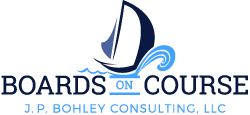Tip #97 What Information Should a Board Focus On?
Before turning to some guidelines, it may be helpful to review the different kinds of information that a Board may focus on. Policy Governance®, I believe, may have a helpful categorization of such information. The Policy Governance® model identifies three types of information: decision information, monitoring information, and incidental information.
Decision Information. This type of information is used by the board to inform its decision-making, primarily related to issues of organizational direction and protection. Organizational direction or purpose, in the Policy Governance® model, involves decisions about what good the organization is to produce and for whom as well as decisions about the value and relative priority of various goods or benefits the organization is to produce. Organizational protection involves decisions designed to protect the organization from imprudent (overly risky) management decisions and unethical behavior. Decision information may include information helpful for organizational purpose such as related societal trends, trends specific to the organization’s line of business, information from the organization’s key stakeholders, unmet community needs, etc. Decision information related to organizational protection may include information about actual and potential risks as well as ethical standards and common violations of such standards. Information from monitoring reports can inform board decision-making about both organizational direction as well as organizational protection.
Monitoring Information. This type of information comes from the board’s monitoring of organizational performance. The board routinely monitors such performance according to performance criteria established by the board. In the Policy Governance® model, such criteria are incorporated into board policies about organizational direction (Ends policies) and about organizational activity (Executive Limitations policies).
Incidental Information. This type of information includes information specifically required by the board (such as anticipated or actual litigation, anticipated adverse media coverage, changes in key staff positions, etc.) or other information that may be desired by the board such as CEO operational plans, CEO concerns, organizational programs and services, organizational success stories, etc.
Since boards have limited board meeting time available for the governance of their organizations, it is important that boards have significant amounts of board meeting time available for core governance functions. The following guidelines may be helpful:
1. Allocate most board meeting time to processing decision information which is critical to effective direction and protection of their organizations as well as to the management and continuous improvement of the governance function (board member recruitment, board agenda planning, stakeholder engagement, self-monitoring of board performance, etc.). Consider allocating about 65% of board meeting time to this type of information.
2. Review organizational monitoring information efficiently. To save time at board meetings, performance monitoring reports primarily developed by the CEO and/or staff as directed by the CEO can be provided to the board in advance of board meetings and any questions or concerns that board members have about these reports can be communicated to the board chair prior to the meeting. Consider allocating about 25% of board meeting time to board discussion of monitoring information.
3. Consider limiting discussion of incidental information to the remaining board meeting time, that is, about 10% of board meeting time. To save board meeting time spent on incidental information, consider having the CEO send out the CEO report to board members prior to the board meeting.
4. Place the highest priority on decision information. Make sure such information gets discussed early in the board meeting so that it doesn’t get crowded out by other types of information.
To learn more about the Policy Governance® model, please click https://www.BoardsOnCourse.com/policy-governance.
